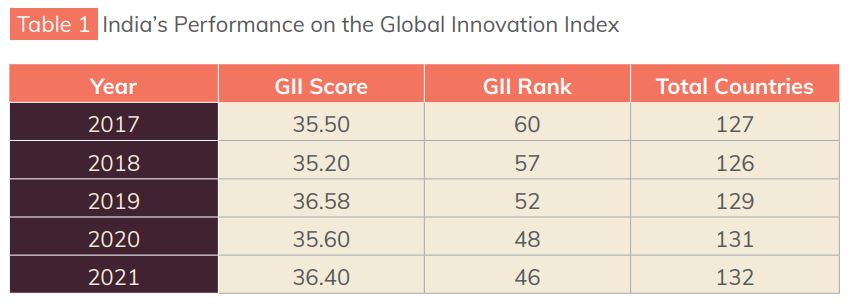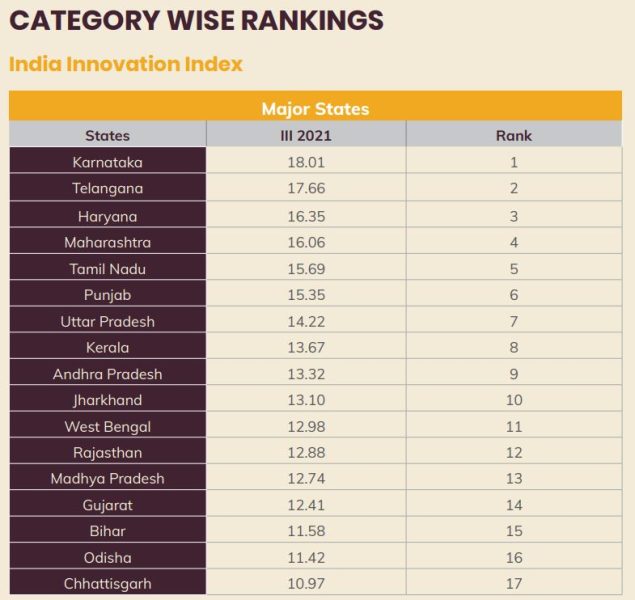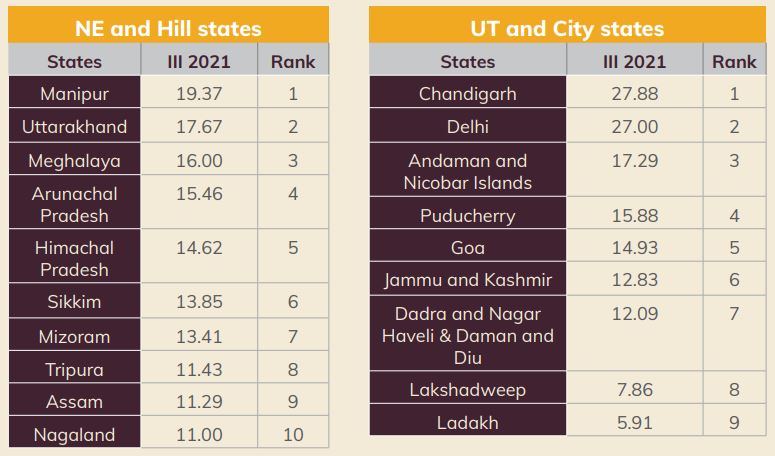
India Innovation Index 2021: Karnataka, Manipur, Chandigarh top

Karnataka, Manipur and Chandigarh have topped in their respective categories in the NITI Aayog’s India Innovation Index 2021.
The index was released on Thursday (July 21) by NITI Aayog Vice Chairman Suman Bery in the presence of member Dr VK Saraswat, CEO Parameswaran Iyer and senior advisor Neeraj Sinha, and Institute for Competitiveness Chairman Dr. Amit Kapoor.
While Karnataka has topped again in the ‘Major States’ category, Manipur is leading the ‘North East and Hill States’ category and Chandigarh is the top performer in the ‘Union Territories and City States’ category.
Also read: Bengaluru set to pip Shanghai in global startup ecosystem index: Report
According to the report, in the Global Innovation Index (GII), India, from the 60th position in 2017, has reached the 46th spot in 2021. India was ranked 1st among the Central and South Asian nations and 2nd among the lower-middle-income countries.

“The third edition of the India Innovation Index 2021 too is set against the backdrop of the Covid-19 pandemic, which has disrupted the global socio-economic landscape. But human resilience and crisis-driven innovation have kept India and the world afloat in these difficult times,” the report said.
“The India Innovation Index has been prepared on the basis of extensive research and critical analysis of the states and union territories. The report presents an evaluation of the innovation readiness of states and UTs and highlights potential challenges that deter the government, businesses and individuals from fully realising their potential,” it added.

What is India Innovation Index?
Prepared by NITI Aayog and the Institute for Competitiveness, the India Innovation Index is a comprehensive tool for the evaluation and development of the country’s innovation ecosystem. It ranks the states and the union territories on their innovation performance to build healthy competition amongst them.
Also read: Modi lays stress on entrepreneurship, innovation and new businesses
The India Innovation Index 2021 presents state-wise rankings based on the innovation landscape and performance of the country’s states and union territories. The latest framework of the index has been mapped from the Global Innovation Index, published annually by WIPO (World Intellectual Property Organization). The number of indicators has increased from 36 (in the India Innovation Index 2020) to 66 (in the India Innovation Index 2021).
The indicators are now distributed across 16 sub-pillars, which, in turn, form seven key pillars – human capital, investment, knowledge workers, business environment, safety and legal environment, knowledge output, and knowledge diffusion. These pillars were divided across 66 indicators to determine the innovation capacity of states/UTs.
The contours of the India Innovation Index 2021 remain the same as last year. Similar to the previous edition, the five ‘Enabler’ pillars measure inputs and the two ‘Performance’ pillars measure output.
All the indicators in the Enabler pillars cover features crucial for promoting innovation within a state/union territory. Indicators in the Performance pillars represent a nation’s output in knowledge creation and competitiveness.
“The overall index score is about 14.56. This is arguably low but we are ambitious to enter into the top 25 nations on the Global Innovation Index (GII). Although our performance has improved on the GII over the years, in order to achieve our ambitious targets, we need to traverse the distance. To draw conclusions, one needs to delve deeper into the analysis. Overall, India has performed well on certain pillars like ‘human capital’, ‘safety & legal environment’, and ‘business environment’, the scores of all of which are higher than the national average,” the report said.
Also read: Govt support, investments needed to support innovation in traditional medicine: WHO chief
“States have scored fairly high on some of the enablers, the performing pillars have scored low, which means that the effectiveness of enablers (with an average score of 19.50) has not been reflected in the performing pillars (with an average score of 9.62). This implies that the enablers haven’t been used optimally,” it added.

36 states ranked
The India Innovation Index ranks 36 Indian states based on innovation scores calculated by measuring the enabler (Human Capital, Investment, Knowledge Workers, Business Environment, and Safety and Legal Environment) and performer (Knowledge Output and Knowledge Diffusion) dimensions. The states/UTs have been divided into three categories.
Overall, wide variation was observed among the states. This year 16 states have performed above the national average. Among the nine Union Territories and city-states, the average innovation score is 15.74, higher than the national average.
Chandigarh was the best performer, with a score of 27.88 and topped the overall rankings, followed by Delhi with a score of 27.00. Ladakh was at the bottom with a score of 5.91.
Chandigarh topped the knowledge worker pillar while ensuring investment in school and higher education. Delhi has topped the business environment and investment pillars, with a large number of incubator centres, a skilled labour force and its continuously transforming start-up ecosystem. This has been reflected in their overall performance as well.
Also read: Indian startups created value, wealth during pandemic: Modi in Mann ki Baat
Both performed higher in the ‘performers’ pillars. Ladakh and Lakshadweep occupy the last positions, with 5.91 and 7.86 scores, respectively. They have consistently performed low on all the pillars due to their geographical shortcomings and economic constraints, which require immediate attention to promote an innovative environment.
Chhattisgarh scores least
Among the 17 major states, Karnataka, with a score of 18.01, is the top performer, followed by Telangana and Haryana. Chhattisgarh has scored the least, 10.97. And the average score for the Major States’ category is 14.02.
Karnataka’s high score can be attributed to its peak performance in attracting FDI (During FY 2021–22, Karnataka was the top recipient state, with 38% of the total FDI equity inflow) and a large number of venture capital deals. Karnataka also scores high in the ‘Performer’ dimension, with the highest share of Information and Communication Technology (ICT) exports and GI registrations, the report said.
Uttar Pradesh and Haryana have registered significant gains in promoting an innovative business environment with a large base of internet subscribers and a safe ecosystem for further investment in the region.
Manipur tops
The North-Eastern and Hill States category comprises 10 states. The average score of this category is 14.41. Manipur with a score of 19.37 is at the top and Nagaland with a score of 11 is at the bottom.
Manipur scored best in the knowledge workers and safety and legal environment pillars. Uttarakhand has the second highest score due to the state government’s high R&D investment. Uttarakhand also registered the highest expenditure on school education – 20.10% of its GSDP.
Nagaland and Tripura scored the lowest due to their unutilised talent as indicated by their low performance in human capital and business environment, which indicates that their innovation capabilities have not been harnessed to their full potential.
The high-performing states have fared better in the Performer dimension than in the Enabler one. This shows that innovation output surpasses these states’ input capabilities. The low-performing states – except for Ladakh and Lakshadweep – on the other hand, have scored more on the Enabler dimension than the Performer one, which indicates that their inputs have not been translated into innovation-induced outcomes, the report said.

